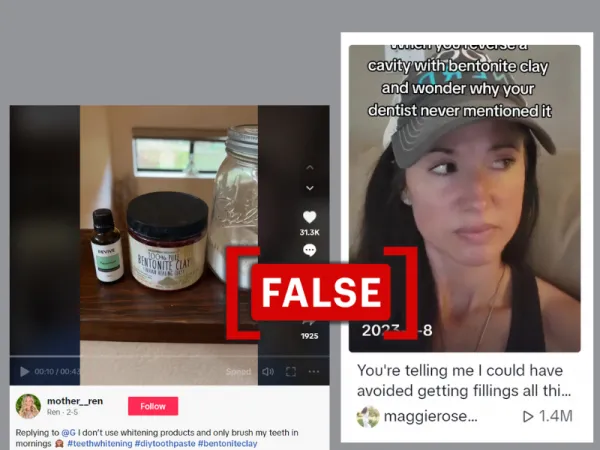By: Siri Christiansen
February 22 2024
 TikTok videos advocating bentonite clay as a cure for cavities. Source: TikTok/Screenshot (Modified by Logically Facts)
TikTok videos advocating bentonite clay as a cure for cavities. Source: TikTok/Screenshot (Modified by Logically Facts)
There are no clinical trials available online examining the effect of bentonite clay in reversing cavities.
The claim
A viral TikTok video viewed over half a million times is advocating a DIY toothpaste made of bentonite clay, hydrogen peroxide, and baking soda, spreading the false claim that this helps whiten teeth and “reverse” cavities.
Bentonite clay, a natural, mineral-rich clay formed from volcanic ash, is believed to have anti-inflammatory, antibacterial, and detoxifying properties. Toothpaste recipes involving bentonite clay have gone viral on the platform several times before (archived here, here, and here), with one video from December 2023 amassing over 2 million views. The videos often imply that dentists don’t inform patients of the healing powers of bentonite clay because they want to make money from root canal fillings.
Source: TikTok/Screenshot (Modified by Logically Facts)
In fact
The claim that bentonite clay can reverse cavities has been researched by the fact-checking organizations AFP Fact Check and The Healthy Indian Project (THIP) – both of which concluded that there is no scientific evidence showing that bentonite clay has anti-cavity properties.
This is also the conclusion of Peter Lingström, professor in cariology and head of the Institute of Odontology at Sahlgrenska Academy, University of Gothenburg, Sweden.
“The claim that it [the toothpaste] ‘reverses cavities’ is a completely false claim,” Lingström told Logically Facts, adding that he has not found a single study evaluating the effect of the toothpaste recipe in the TikTok video.
“There is no toothpaste that has a content that can restore lost tooth substance of this kind. However, substances such as fluoride, calcium, and phosphate can remineralize – return minerals – in a tissue that is demineralized – where mineral loss has occurred – which is the first stage in the development of a caries lesion,” he added. “In my understanding, this toothpaste does not contain fluoride or other remineralizing substances.”
A 2017 review on bentonite clay as a natural remedy found 100 articles on the topic among 2,500 scientific articles published in PubMed, none involving teeth, dental hygiene, or cavity treatment. Instead, the studies looked at the effect of bentonite on body detoxification, skin-related issues, diarrhea and IBS, kidney function, antibacterial purposes, cancer, bleeding and clotting, and other issues. The review found that further research is needed.
Using bentonite clay as toothpaste could also be harmful due to the prevalence of heavy metals, which can be absorbed through the skin and gums.
A 2013 study found that oral bentonite clay available for sale in the Netherlands contained lead, arsenic, mercury, and cadmium. In 2016, a bentonite toxicology review found that some products may contain variable amounts of respirable crystalline silica, which is a carcinogen. The same year, the U.S. Food and Drug Administration warned consumers not to use the products Best Bentonite Clay and Bentonite Me Baby – both of which were labeled safe for oral use at the time – because they were found to contain elevated lead levels. These concerns are still present, as a 2020 study found that samples of bentonite clay contained high concentrations of arsenic and lead.
The verdict
There are no readily available clinical trials on the effect of bentonite clay on treating cavities. The research that does exist about bentonite clay has mainly focused on its potential as a detoxifying agent. Therefore, we have marked this claim as false.